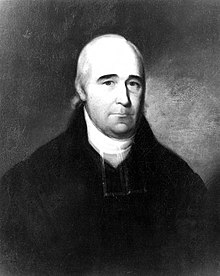Richard Furman
| Richard Furman | |
|---|---|
 |
|
| Born |
9 October 1755 Esopus, New York, United States |
| Died | 25 August 1825 (aged 69) Charleston, South Carolina, United States |
| Nationality | United States |
| Occupation | Baptist pastor |
| Known for | First president of the Triennial Convention |
Richard Furman (9 October 1755 – 25 August 1825) was an influential Baptist leader from Charleston, South Carolina, United States. He was elected in 1814 as the first president of the Triennial Convention, the first nationwide Baptist association. Later he was the first president of the South Carolina State Baptist Convention.
Furman was born in Esopus, New York. He was raised in Charleston, South Carolina in a family of evangelical Calvinists. He had little formal education, but was taught mathematics and other sciences by his father and taught himself several languages including Latin, Greek and Hebrew. Through his self-directed studies he also gained extensive knowledge of history, theology and medicine as it was practiced in those days. Furman accepted the Baptist faith in 1771 aged 16, and began to preach at that early age. He was ordained as pastor of High Hills church two years later. During the American War of Independence (1775–1783) Furman volunteered to serve in the colonial army, but was persuaded that his talents could better be used as a speaker in gaining support for the cause. On the fall of Charleston to British forces in 1780, General Charles Cornwallis announced a £1,000 bounty for his capture, and he was forced to flee the state.
After the war, Furman was a proponent of the constitutional clauses that ensured freedom of worship and removed all special privileges from the Episcopal church. In 1786 he became pastor of the Charleston Baptist Church, holding this post for the rest of his life. He made a great impression on the young William Bullein Johnson, who would later himself become a Baptist leader and first president of the Southern Baptist Convention. As moderator of the Charleston Baptist association, he arranged for funding for the education of young ministers and for funding of missionary activity in the state. Furman was a founder of the Charleston Bible Society and the Religious Tract Society. Rhode Island College (later Brown University) awarded him an honorary master's degree in 1792 and Doctor of Divinity Degree in 1800.
...
Wikipedia
